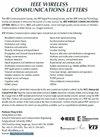上行多主动式star - ris辅助NOMA系统资源分配的元学习
IF 5.5
3区 计算机科学
Q1 COMPUTER SCIENCE, INFORMATION SYSTEMS
引用次数: 0
摘要
同时发射和反射可重构智能表面(STAR-RIS)是一种实现全空间覆盖的新技术。在这封信中,考虑了在上行传输中使用非正交多址的多有源star - ris辅助系统,其中多个有源star - ris之间的二阶反射辅助从单天线用户到多天线基站的传输。具体而言,通过联合优化主动式STAR-RIS的主动式波束形成、功率分配、发射和反射波束形成以及用户主动式STAR-RIS分配来解决总和速率最大化问题。为了解决非凸优化问题,提出了一种将元学习与深度确定性策略梯度(deep deterministic policy gradient, DDPG)相结合的深度强化学习算法。数值结果表明,本文提出的Meta-DDPG算法比DDPG算法提高了19%,而多活动STAR-RISs之间的二阶反射使总数据速率提高了74.1%。本文章由计算机程序翻译,如有差异,请以英文原文为准。
Meta-Learning for Resource Allocation in Uplink Multi-Active STAR-RIS-Aided NOMA System
Simultaneously transmitting and reflecting reconfigurable intelligent surface (STAR-RIS) is a novel technology which enables the full-space coverage. In this letter, a multi-active STAR-RIS-aided system using non-orthogonal multiple access in an uplink transmission is considered, where the second-order reflections among multiple active STAR-RISs assist the transmission from the single-antenna users to the multi-antenna base station. Specifically, the total sum rate maximization problem is solved by jointly optimizing the active beamforming, power allocation, transmission and reflection beamforming at the active STAR-RISs, and user-active STAR-RIS assignment. To solve the non-convex optimization problem, a novel deep reinforcement learning algorithm is proposed which integrates Meta-learning and deep deterministic policy gradient (DDPG), denoted by Meta-DDPG. Numerical results reveal that our proposed Meta-DDPG algorithm outperforms the DDPG algorithm with 19% improvement, while second-order reflections among multi-active STAR-RISs provide 74.1% enhancement in the total data rate.
求助全文
通过发布文献求助,成功后即可免费获取论文全文。
去求助
来源期刊

IEEE Wireless Communications Letters
Engineering-Electrical and Electronic Engineering
CiteScore
12.30
自引率
6.30%
发文量
481
期刊介绍:
IEEE Wireless Communications Letters publishes short papers in a rapid publication cycle on advances in the state-of-the-art of wireless communications. Both theoretical contributions (including new techniques, concepts, and analyses) and practical contributions (including system experiments and prototypes, and new applications) are encouraged. This journal focuses on the physical layer and the link layer of wireless communication systems.
 求助内容:
求助内容: 应助结果提醒方式:
应助结果提醒方式:


